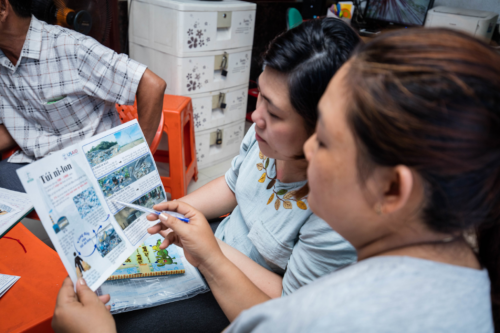Learning from Locally-led Actions to Combat Plastic Pollution in Vietnam

With an estimated 8 million metric tons of plastic waste entering the world’s oceans each year, ocean plastic pollution has become an urgent environmental challenge.
Ocean plastic pollution is a global problem with local roots. The majority of plastic waste that ends up in the ocean originates from land-based sources. Where solid waste management (SWM) systems are inadequate, larger shares of plastic are at risk of leaking into the ocean. And, with total waste generation projected to increase in fast-growing and urbanizing regions, more ocean plastic pollution is likely if SWM is not improved.
From collection to treatment and disposal, solutions to improve SWM must be grounded in realities of the local systems within which waste management services are delivered. In our new case study, we explore local solutions implemented in Vietnam under USAID’s Municipal Waste Recycling Program (MWRP).
MWRP supports locally led innovations to improve solid waste management and recycling in urban and peri-urban areas, through grants and technical assistance. At the heart of the program’s design is a local systems approach, which requires local actors—including government, private sector, civil society, and citizens—to collaborate to produce a development outcome.
Our study examined two MWRP projects: The Informal Sector on Plastics implemented by Environnement et Développement du Tiers-Monde (ENDA) in Ho Chi Minh City (HCMC), and Oceans Without Plastics implemented by the Center for Environment and Community Research (CECR) in Da Nang. Both implementers are non-governmental organizations.
The projects aimed to improve solid waste management and shared a strategy of engaging local stakeholders, through trainings, awareness campaigns, and policy advocacy, to reduce their plastic use, separate waste at source, and recycle plastic waste. Success in these areas has potential to reduce the amount of plastic at risk of leaking into the ocean.
Three Takeaways from MWRP in Vietnam
- Solutions to development challenges can come from multiple sources within a local system. Actors in a local system play different, but complementary roles in addressing solid waste management challenges. In HCMC and Da Nang, for example, independent waste collectors (IWCs) share waste collection responsibilities with local utility companies, while informal sector actors take the lead on recycling, without government direction or support. At the same time, environment-focused NGOs also help shape the response to SWM challenges by drawing on their expertise to inform policy-making process at local and national levels.
Despite having an important role in addressing complex SWM challenges, local governments cannot do it alone. In the face of constraints such as such as lack of technical skills for policy implementation and limited financial resources for infrastructure investments, contributions from civil society and private actors are crucial to sustain the momentum for change. Building on the legacies of informal or other non-governmental efforts could help local governments form better, locally appropriate responses to SWM challenges.
- Local civil society actors need capable local government partners to scale. The support of local authorities, for instance, proved critical to secure households’ buy in to waste separation and recycling goals at the neighborhood level. But when government capacity constraints cause breakdowns in solid waste management, initiatives of local civil society actors suffer setbacks. Both cities have regulations requiring households to separate waste, but they are poorly enforced. For the project leaders we interviewed, the weak enforcement of SWM regulations was a missed opportunity to increase household waste separation and push beyond the limits of NGO-led awareness-raising and training programming. More broadly, capable local governments are needed to coordinate local innovations and enhance their collective impact.
- Local systems respond to national signals. In June 2019, Vietnam’s Prime Minister laid out a vision to curb plastic pollution in the country, including a pledge to ban single-use plastics by 2025. National level prioritization of plastic pollution appears to have motivated local actions, in line with the national ambition.
Following the Prime Minister’s declaration, local authorities partnered with socio-political organizations like the Women’s Union to organize campaigns which educated citizens on the importance of reducing plastic waste. In addition to passing mandatory waste separation regulations, local authorities have also reduced their use of plastic products in their offices.
Policy frameworks that establish a link between districts, cities, and the national level can help turn these local initiatives into a more cohesive response to the challenge of plastic pollution. Importantly, such policy frameworks need to be informed by insights from local actors, such as environmental NGOs, allowing for adequate consideration of local realities which have a bearing on the attainment of the national level goal of eliminating plastic litter from land- and ocean-based sources by 2025.
These insights suggest that there are multiple entry points to support local systems to improve solid waste management and tackle ocean plastic pollution. Development partners can, for example, focus on building local government capacity, strengthening civil society groups, or supporting national level policies to which local systems are linked.
Read more about our findings from CECR and ENDA and see the full case study report. Learn more about USAID’s Municipal Waste Recycling Program here.
Ladi Williams is a Research Analyst at the Urban Institute, a partner in USAID’s Communications, Evidence and Learning (CEL) project.

